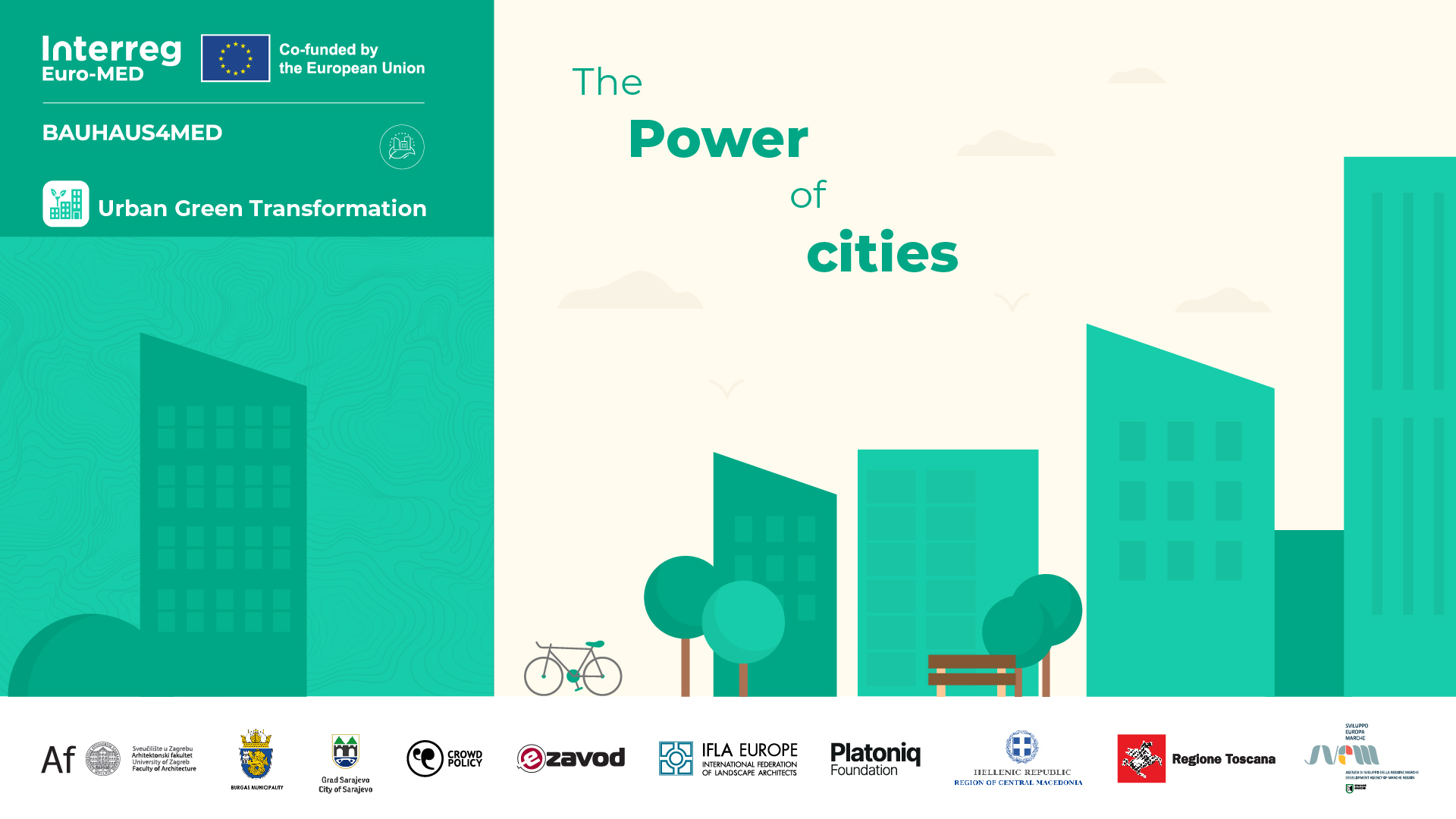In a world grappling with climate change, resource depletion, and rapid urbanization, cities have emerged as critical battlegrounds in the fight for a sustainable future. The BAUHAUS4MED project, with its focus on urban green transformation in the Mediterranean region, underscores the pivotal role cities play in shaping our collective destiny. However, have we truly explored why cities are such a vital focus for sustainable development campaigns and interventions?
Cities are the beating heart of human civilization, serving as hubs of innovation, culture, and economic activity. They are also where the battle for a sustainable future will be largely won or lost. Despite facing immense challenges in the 21st century, cities hold incredible potential to drive positive change toward a more sustainable world.

Cities consume 78% of the world’s energy and produce more than 60% of global greenhouse gas emissions (UN-Habitat, 2016). This concentrated impact makes transforming cities essential to tackling climate change and resource depletion. Yet, cities are more than just contributors to these challenges; they are also key players in pioneering solutions.
As breeding grounds for new ideas and technologies, cities possess the intellectual capital and entrepreneurial spirit needed to pioneer sustainable solutions in energy, transportation, waste management, and urban planning (Glaeser, 2011). The “Sharing Cities” program, for example, fosters collaboration between European cities to develop and implement smart city solutions (Sharing Cities, 2024). Additionally, cities often act as policy innovators, experimenting with sustainable practices that can be scaled up to regional and national levels. The C40 Cities Climate Leadership Group, a network of megacities committed to addressing climate change, exemplifies this influential capacity (C40 Cities, 2024).
Citizen power also plays a crucial role. Cities are home to diverse communities with a vested interest in creating a sustainable future. Grassroots initiatives can drive powerful bottom-up change, as demonstrated by the Transition Towns movement, which promotes community-led responses to climate change and peak oil (Hopkins, 2008).
Cities face a complex web of challenges, including rapid urbanization, climate vulnerability, and resource depletion. The influx of people into urban areas strains resources and infrastructure, exacerbating issues such as pollution, congestion, and inequality (UN DESA, 2018). Moreover, cities are particularly vulnerable to the impacts of climate change, including extreme weather events, rising sea levels, and heat waves (IPCC, 2021). Their high consumption patterns place immense pressure on natural resources, leading to deforestation, water scarcity, and biodiversity loss (WWF, 2020).
However, these challenges also present significant opportunities. The density of cities allows for efficient resource use and the implementation of sustainable infrastructure like public transportation systems and renewable energy grids (Newman & Kenworthy, 1999). Urban areas foster partnerships between governments, businesses, and citizens, creating spaces for innovative solutions. Living Labs, which bring together stakeholders to co-create and test urban innovations, serve as a promising model for such collaborations (Dell’Era & Landoni, 2014).
Empowered citizens can also play a crucial role in driving sustainable practices. From reducing their own environmental footprint to advocating for policy changes, the rise of urban gardening initiatives and community energy projects illustrates the power of citizen-led change.
Rather than viewing cities merely as problems to be solved, they should be seen as powerful engines of change. By embracing sustainable practices, cities can become beacons of hope, illustrating how to live in harmony with the planet while maintaining a high quality of life for all.
Key Actions for Sustainable Cities:
- Invest in Green Infrastructure: Parks, green roofs, urban forests, and sustainable drainage systems can mitigate climate change impacts, improve air quality, and enhance biodiversity.
- Promote Sustainable Transportation: Prioritizing walking, cycling, and public transportation can significantly reduce congestion, pollution, and reliance on fossil fuels.
- Embrace Circular Economy Principles: Reducing waste, reusing resources, and encouraging sustainable consumption patterns can transform cities into models of resource efficiency.
- Empower Citizens: Engaging communities in planning and implementing sustainable initiatives fosters a sense of ownership and shared responsibility.
- Foster Innovation: Supporting the development and implementation of innovative technologies and solutions is key to sustainable urban development.
By taking these actions, cities can lead the way toward a sustainable future, demonstrating that a thriving urban environment and a healthy planet can go hand in hand.
In the fight against climate change and resource depletion, cities are not just battlegrounds; they are our most powerful allies in building a more sustainable world.


